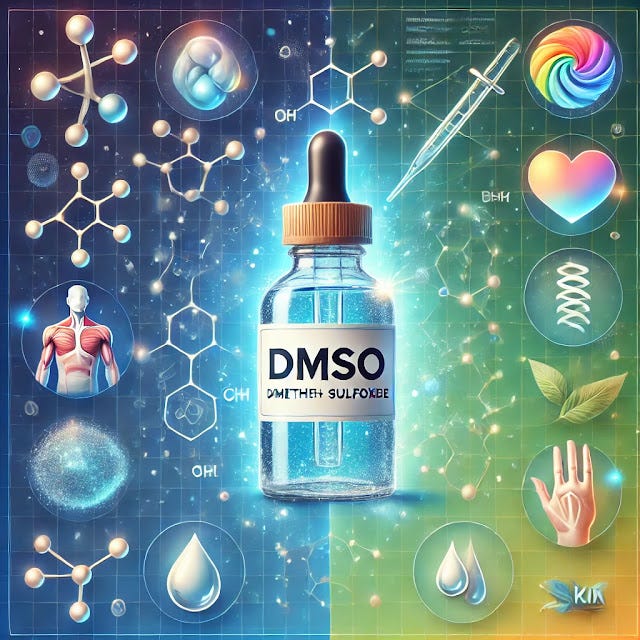Dimethyl sulfoxide (DMSO) is a natural compound that has garnered attention for its potential role in cancer therapy. While still considered experimental and complementary, some patients and integrative clinics have reported promising results. This guide provides an overview of DMSO, its potential benefits, risks, and how it may be incorporated into cancer care under professional supervision.
What is DMSO?
DMSO is an organic sulfur compound originally used as an industrial solvent. It can penetrate skin and biological membranes easily, carrying other substances with it. Medically, it has been used for pain relief, inflammation, and tissue healing. More recently, research has explored its potential to inhibit cancer cell growth, induce cancer cell differentiation, and enhance the effects of chemotherapy.
How Might DMSO Help in Cancer Treatment?
Inhibiting cancer growth: Laboratory studies suggest DMSO can slow the proliferation of various cancer cells, including bladder, breast, leukemia, prostate, ovarian, and lung cancers.
Inducing apoptosis: DMSO may trigger programmed cell death in cancer cells, a key mechanism to control tumor growth.
Enhancing chemotherapy: It can increase the absorption and effectiveness of chemotherapy drugs, potentially allowing lower doses and reducing side effects.
Protecting healthy cells: DMSO may shield normal tissues from damage caused by radiation or chemotherapy.
Stimulating immune response: By altering cancer cell properties, DMSO may make tumors more visible to the immune system.
Current Clinical Status
Research stage: While many laboratory and animal studies support DMSO’s anti-cancer effects, clinical trials in humans are limited and ongoing.
Medical consensus: Major cancer organizations, including the American Cancer Society, state there is insufficient evidence to recommend DMSO as a standalone cancer treatment. It should not replace conventional therapies.
Integrative use: Some holistic cancer centers, such as the Cancer Center for Healing in Irvine, CA, incorporate DMSO as part of comprehensive, personalized treatment plans alongside chemotherapy, radiation, and supportive therapies.
What to Expect from DMSO Treatment
Administration
DMSO is often applied topically as a liquid to the skin near the tumor site or taken orally under medical supervision.
Dosage and frequency vary depending on the treatment protocol and cancer type.
It is typically used in combination with other therapies for synergistic effects.
Possible Side Effects
Common: Skin irritation, redness, itching at application site.
Other: Headaches, dizziness, nausea.
Odor: DMSO metabolism causes a characteristic garlic-like smell on breath and skin, which is harmless but may be socially noticeable.
Precautions: Avoid contact with contaminants on the skin as DMSO can carry substances into the bloodstream.
Safety Notes
Use only under qualified healthcare supervision.
Avoid self-administration or use of non-pharmaceutical grade DMSO.
Discuss all medications and supplements with your healthcare provider to avoid interactions.
Integrative Treatment Modalities Complementing DMSO
At centers offering DMSO therapy, patients often receive holistic care including:
Nutritional Support: Boost immune function and overall health
Mind-Body Techniques: Reduce stress and improve mental wellbeing
Oxygen Therapy: Enhance cell metabolism and healing
Chelation Therapy: Remove toxins and heavy metals
Hyperthermia Therapy: Target cancer cells with heat
Massage Therapy: Alleviate pain and improve circulation
Who Should Consider DMSO Therapy?
Patients interested in complementary therapies alongside conventional cancer treatments.
Those seeking to reduce chemotherapy side effects or enhance treatment efficacy.
Individuals under care at integrative cancer centers with experience in DMSO protocols.
Important Questions to Ask Your Healthcare Provider
Is DMSO appropriate for my cancer type and stage?
How will DMSO be integrated with my current treatment plan?
What are the expected benefits and risks in my case?
How will side effects be monitored and managed?
Are there any contraindications or drug interactions I should be aware of?
Summary and Final Advice
DMSO offers a promising complementary approach in cancer care, with potential to inhibit tumor growth, improve chemotherapy outcomes, and protect healthy tissues. However, it remains investigational, and more clinical research is needed to confirm its safety and efficacy.
Always consult with your oncologist or integrative medicine specialist before starting DMSO therapy. It should never replace standard cancer treatments but may be considered as part of a comprehensive, personalized plan under professional guidance.
Resources and Support
Cancer Center for Healing (Irvine, CA): Offers personalized integrative cancer care including DMSO therapy.
Memorial Sloan Kettering Cancer Center: Provides evidence-based information on DMSO and cancer.
American Cancer Society: For guidance on complementary therapies and cancer treatment options.
Disclaimer: This guide is for educational purposes only and does not substitute professional medical advice. Treatment decisions should be made in consultation with qualified healthcare providers.
Sources:
DMSO for Cancer: Relieving Cancer’s Silent Struggles with Chemo, Pain, and Radiation (Part 1)
DMSO for Cancer: How DMSO Naturally Eliminates Cancers (Part 2)
DMSO for Cancer: DMSO and Hematoxylin Combination (Part 3)
This article is part of the cancer series. Explore other popular articles related to this series:





Hello! Thank you for helping to get the word about about DMSO so it can help more people!
I bought some and read literature on this. Going to start on my varicose veins on the one leg. After that work on my arthritis.